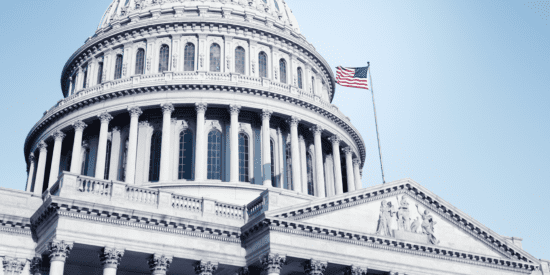Dear Speaker Pelosi, Majority Leader McConnell, Minority Leader Schumer, and Minority Leader McCarthy:
Thank you for your hard work on passing previous COVID-19 relief packages. I’m grateful for your efforts and your dedication to assisting others during this time of crisis. While those packages include many provisions to aid people who have been affected by the crisis, there are more steps that need to be taken to help.
The economic impacts of the COVID-19 crisis will be difficult for many and devastating for others, including our nation’s most vulnerable populations. As you work on the details of a Phase 4 legislative package, I write to ask you to include our nation’s charitable sector and protect our vulnerable populations. The charitable sector is on the frontlines of this crisis, providing care and resources for the unemployed, the elderly, and the vulnerable. There are many suffering from COVID-19, but certain vulnerable populations are suffering from unique burdens and challenges right now.
I’d like to ask you to include the following provisions in a Phase 4 package:
Charitable Sector and Nonprofits Provisions
Two-year Universal Charitable Deduction to Encourage Giving to Charities
A Universal Charitable Deduction (UCD) would incentivize all taxpayers to give to nonprofits and charities, including churches. This action would help mitigate the economic impacts of the COVID-19 pandemic. Our government should welcome the generosity of all citizens–at all levels of income–who desire to help their neighbors through religious associations, educational institutions, and any organization that relieves poverty.
The Tax Cuts and Jobs Act of 2017 doubled the standard deduction, which means that most Americans no longer itemize their deductions. Under the federal tax code, people can only claim a deduction for charitable contributions if they itemize their deductions. Since the amount of people who itemize deductions has shrunk, many nonprofits are concerned there would be a drop in donations, because of the lack of incentive to give. The Charitable Deduction is the only deduction for which the taxpayer receives no other material benefit (compared with the mortgage interest deduction or tuition deduction).
The Phase 4 relief package should include an unlimited Universal Charitable Deduction, retroactive to 2019 and extending for two years to propel American generosity to the organizations serving at the front lines in our communities.
Provide Additional Payroll Support for Charitable Nonprofits
The Paycheck Protection Program (PPP) authorized billions of dollars in forgivable loans to small businesses to pay their employees during the COVID-19 crisis. While some nonprofits were able to access a PPP loan, many others weren’t able to, due to a variety of reasons, including limited funds in the PPP program.
The inability to access those loans will hinder the good work of many nonprofits, and could permanently close other charitable organizations. This could be solved through a nonprofit charity grant program that would be accessed by faith-based charities to support employee retention, hiring, and programming. The funds could be administered through a nonprofit PPP program, and a nonprofit grant program administered by the U.S. Treasury.
Additionally, the 500 employee cap under the PPP could be adjusted to support larger nonprofit organizations. This adjustment will allow for more charitable organizations to be able to receive financial aid, to help keep their doors open. Faith-based and charitable nonprofits are on the frontlines of caring for the vulnerable, especially in times of crisis, and the U.S. government should seek to provide the necessary support for these important organizations.
Support Nonprofit K-12 Schools and Families
While the CARES Act allocated funding for K-12 public schools, there was limited support for faith-based educational institutions that educate millions of children. Congress should provide additional support for nonpublic schools, by enacting a tax deduction, retroactive to 2018 for a portion of tuition payments made by parents to a non-public K-12 school. Parents who choose to enroll their children in these institutions are facing financial strain and stress, and many may be unable to pay the full tuition amount. This tax deduction could ease their burden, and also help the public school sector from being overwhelmed if there was an influx of children and youth enrolling.
Provisions to help Vulnerable and At-Risk Populations
Flexibility within the SNAP Benefit Program
The COVID-19 crisis has impacted food supply chains, driving up the price of food, which has a disparate impact for lower-income families. Many families find themselves newly needing to access the Supplemental Nutrition Assistance Program (SNAP). While Congress did expand and increase unemployment insurance and benefits, many families are still unable to feed their children. Malnutrition weakens peoples’ immune systems, and children who are malnourished face long-term health and cognitive consequences.
In addition, not all SNAP recipients are able to purchase groceries online for home delivery. This especially puts the elderly poor in urban areas at particular risk—they risk exposure on public transportation and at grocery stores. Congress should include a provision that legally expands the USDA online SNAP purchasing pilot program to all states, to help vulnerable SNAP recipients be able to safely get food.
Congress should allow for flexibility within the SNAP program, to ensure that individuals’ needs are met, that all Americans have access to food security, and that participants are able to purchase food in ways that keep them safe. SNAP is the most cost-effective anti-hunger program in the United States and has the added benefit of supporting local small businesses. Allowing flexibility within this program will seek to ensure that people’s basic needs are met, and more Americans will have food security.
Flexibility within the Chafee Program for Foster Youth
The John H. Chafee Foster Care Program for Successful Transition to Adulthood (Chafee Program) provides funds to states, territories, and Indian tribal entities (states) with material and other support for current and former foster youth. Congress should allow for flexibility within this program to serve and support older youth facing the stress and disruptions resulting from the COVID-19 pandemic. Currently, youth age out of foster care between ages 18 and 21, depending on the state they live in. Congress should allow for all youth, in all states to participate in the Chafee program until age 23. This will provide additional resources for youth who have transitioned out of foster care before the COVID-19 crisis hit.
Flexibility on Discharges from the Foster Care System for Youth Ages 18 to 21
Youth in foster care age out between 18 and 21, depending on the state. The statistics are grim for youth that age out under normal circumstances, and many youth experience homelessness, unemployment, incarceration, and are at a higher risk of being trafficked. Congress should place a moratorium on youth aging out during the COVID-19 crisis for youth, ages 18 to 21 to provide safety and security, so they can continue their current living arrangements, and have the support they need. This additional time will help these youth successfully transition out of care.
Flexibility for Compassionate Release in the Federal Prison System
Incarcerated men and women are especially vulnerable in the midst of the COVID-19 crisis because of contained physical space. This is especially true for aging and immunocompromised incarcerated populations. Congress should expand compassionate release during the pandemic, so that higher-risk individuals would be protected from medical harm. The Bureau of Prisons (BOP) and federal courts use this tool to reduce sentences for federal prisoners on a case-by-case basis for “extraordinary and compelling reasons.”
Congress should temporarily reduce the 30 day waiting period for federal prisoners to file a motion for compassionate release directly with a federal court in order to speed up the process and provide quicker physical and medical relief to those incarcerated.
Use Digital Programming in Federal Prisons
In accordance with social distancing guidelines, federal prisons have restricted traditional face-to-face programming and visitation. These prisons should allow for use of electronic tablets for those incarcerated to allow access to rehabilitative programming while the threat of COVID-19 persists. These programs are crucial for long-term outcomes and community reintegration, and we urge Congress to find ways to ensure that these programs can continue.
Support for Second-Chance Entrepreneurs
The Paycheck Protection Program eligibility requirements deny financial relief to small business owners with a criminal record. An estimated one in three Americans have a criminal record, and the strict requirements hinder many business owners from accessing the Paycheck Protection Program. This restriction places an additional burden on those who have already paid their debt to their communities and who are working to support themselves, their families, and their communities.
To the extent that fraud is a concern, SBA has other tools at its disposal, including audits conducted at the time of loan forgiveness. These new restrictions should be lifted to allow all members of our communities to participate.
Thank you again for your hard work during these difficult times. I appreciate your consideration of these issues I raise here, and I look forward to working with you in the coming weeks.
Respectfully,
Russell Moore
President
Ethics & Religious Liberty Commission










